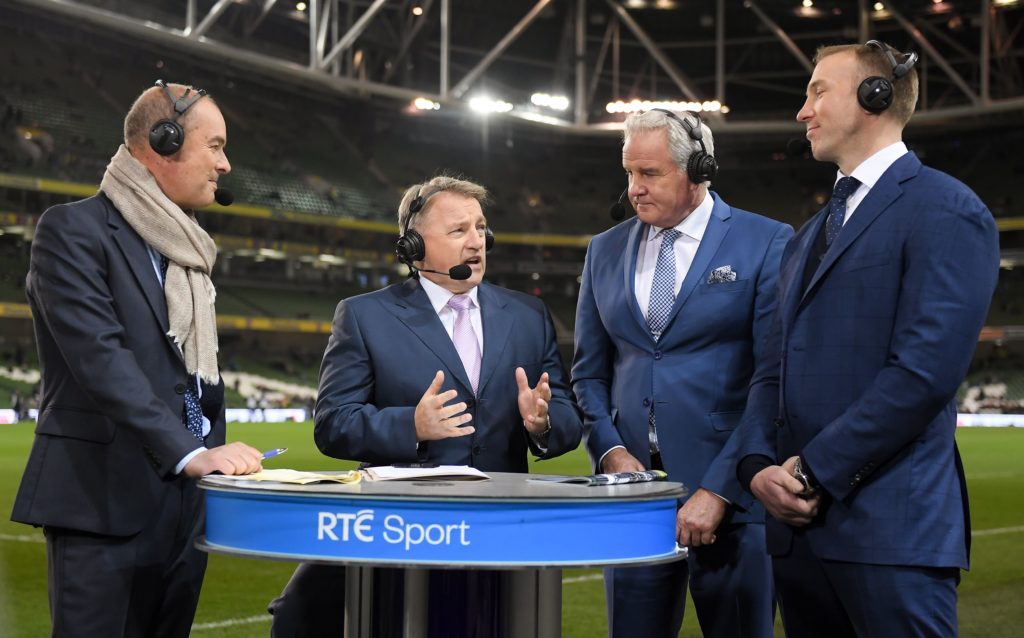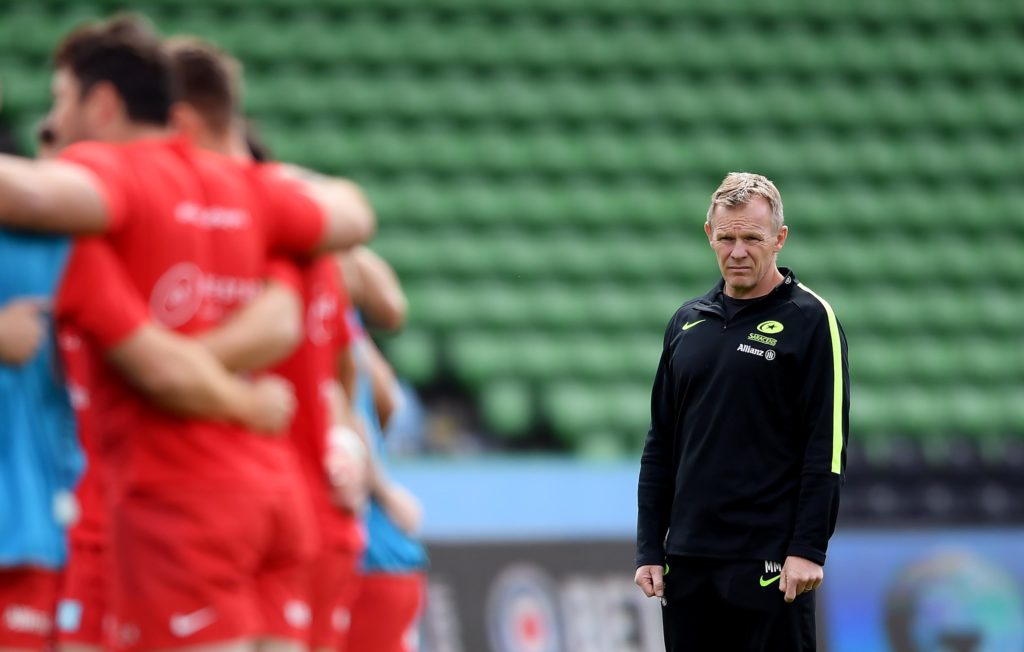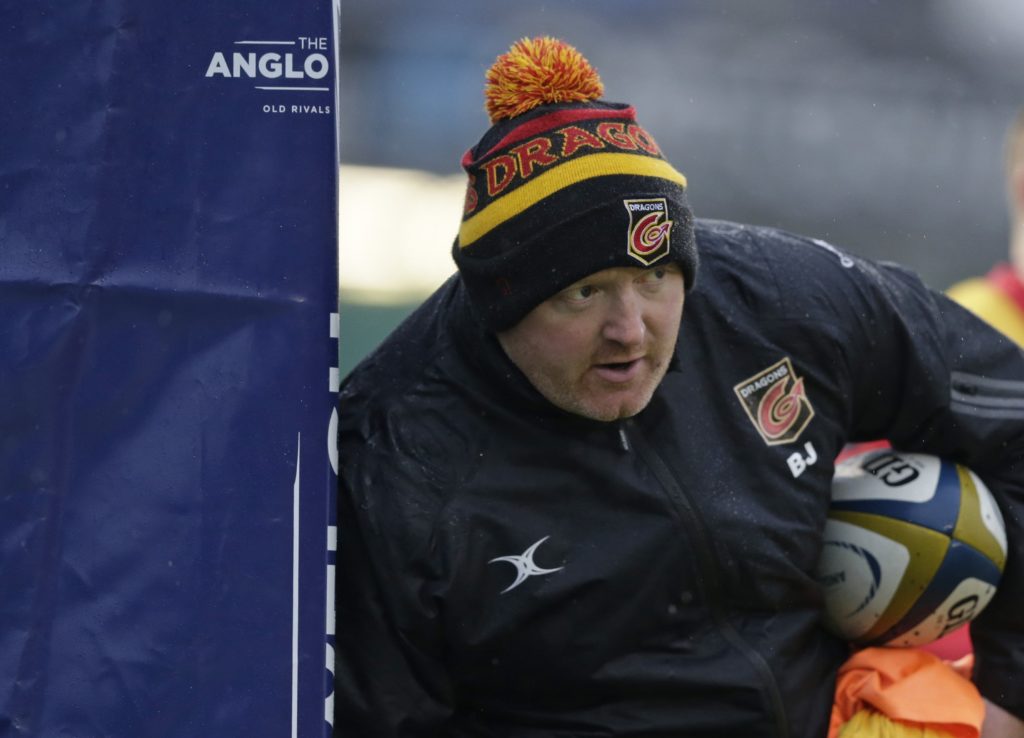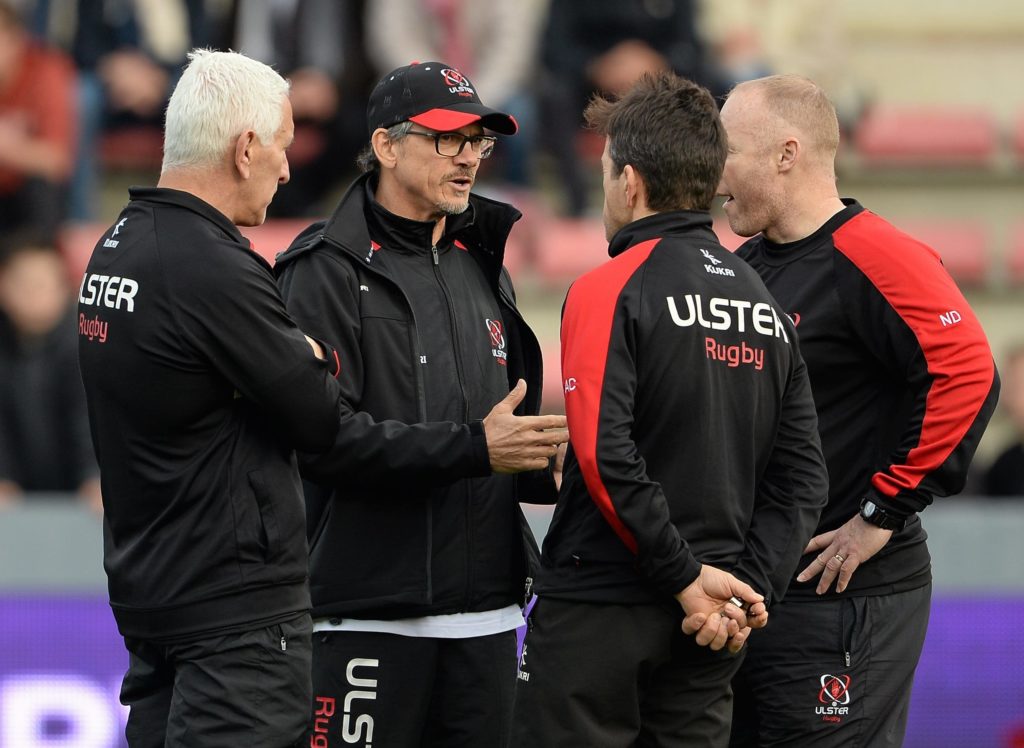As we traverse our way through the season of stocking-fillers, rugby autobiographies are again occupying the shelves in large numbers.
Of those new to the market, none will be more aptly-titled than Eddie O’Sullivan’s 2009 effort ‘Never Die Wondering.’
You see with Eddie you never die wondering what he thinks about a subject – Scotland the latest to be butchered by some of his more acerbic punditry.
‘Deluded’ was the adjective he used to describe Gregor Townsend’s men during the coverage of the Nations Cup third-place play-off on Ireland’s public service broadcaster, RTÉ. The ripples were felt in ponds from Galway to Galashiels.
But to focus singularly upon what O’Sullivan says is to zero in upon the dots of a Monet – you miss the bigger picture.
To focus singularly upon what O’Sullivan says is to zero in upon the dots of a Monet – you miss the bigger picture.
Think instead about what O’Sullivan is doing…or rather for just how long he’s been doing it.
The three-time Triple Crown winner became Ireland’s attack specialist in 1999, took over the head coaching role in 2001, and remained in the post until 2008.
He’s already spent more time on television screens than he did in the coach’s box at Lansdowne Road.
While he’s held other jobs since, most notably leading the USA at the 2011 World Cup and spending a little over a season as Biarittz head coach, his most recent gig was at Old Belvedere, a Dublin side competing in the second tier of the All-Ireland League, the island’s premier amateur club competition.
With their home games played no more than a two-minute stroll from Leinster’s RDS ground, the pro ranks must never have felt further away.

While it’s tempting to simply paint O’Sullivan as yesterday’s man, it’s worth remembering that at 62 he was born within 18 months of Eddie Jones and Steve Hansen. And yet it is six years since he last had a job in professional rugby.
His Ireland predecessor, Warren Gatland, touched upon another common perception regarding O’Sullivan’s ongoing unemployment. “I have always said that technically he was a good coach,” Gatland told Rugby Pass’s The Lockdown, “but I’d question some of his man-management skills.”
The butting of heads with some of his big name players down the years is a poorly kept secret but success can cover all manner of ills. And while what O’Sullivan achieved with Ireland has been eclipsed by the Grand Slams won by his immediate successors, Declan Kidney and Joe Schmidt, when compared to the 15 years prior, his tenure was as transformative as a lottery win to Oliver Twist. Not the jackpot perhaps, but a little goes a long way when all you’re used to is gruel.
For what it’s worth, O’Sullivan, who applied for his old job in Connacht back in 2013 and was not granted an interview, says he is still looking for a position and is willing to work as an assistant.
But it’s eight years now since Matt Williams, the former Leinster and Ulster coach, wrote a column entitled ‘Eddie, welcome to the list of the Irish coaching damned.’
A far from exclusive club back then, Williams wrote “whether the recent decisions to not employ indigenous coaches is a policy or simply a series of random events is irrelevant. The ramification is that there are no opportunities for local talent to develop so there will be few, if any, Irish-born professional coaches in the years to come. While Irish rugby is giving considerable support to reducing New Zealand’s chronic unemployment problem, it is denying a generation of its own coaching community an opportunity.”
While Irish rugby is giving considerable support to reducing New Zealand’s chronic unemployment problem, it is denying a generation of its own coaching community an opportunity.”
Matt Williams
Instead they sought those opportunities elsewhere and still do. Williams was beating the same drum just this week when he spoke of what he termed a ‘cultural cringe’ towards the hiring of Irish coaches on Newstalk radio’s Off The Ball programme.
No nation celebrates their diaspora like Ireland, taking immense pride in how, from the seed of an island just seven million strong, branches accounting for 70 million have spread across the world.
The coaching tree is similarly far flung.
Of the 15 Irish-born coaches working in the Champions and Challenge Cups over this first fortnight of European action, only three are doing so with Ireland’s four provincial sides and that is before we mention Mark McCall (Saracens), Felix Jones (South Africa), Allen Clark (Dallas Jackals) and Greg McWilliams (RUNY) or Geordan Murphy and Conor O’Shea who are between coaching jobs after high-profile stints in charge of Leicester Tigers and Italy respectively.
Connacht, after taking on a Racing 92 side whose attack was devised by Mike Prendergast last week, will welcome John Muldoon and Connor McPhillips back to the Sportsground this weekend thanks to their roles with Pat Lam at Bristol. That alone is more front-line Irish coaches than they’ll face over three weeks of interpro derbies during the festive period.

It’s always lazily presumed that those who learn their trade and broaden horizons in jobs abroad will return as better coaches down the line but in reality the prodigal son narrative is virtually non-existent. While the romantic notion persists that Ronan O’Gara’s successful stints at Racing 92, Crusaders and now La Rochelle are all geared towards eventually taking up the reins with Munster and then Ireland, perhaps even with Paul O’Connell as a running mate, the evidence suggests that most who leave are gone for good.
In the Challenge Cup this weekend, Zebre’s Michael Bradley will take his side to the Brive outfit coached by his former Irish team-mate Jeremy Davidson. The two exiles share more than just their time in the green jersey.
In the lower reaches of the PRO14 and Top 14 respectively, both men have exceeded expectations but, with success relative, their exploits abroad make few headlines and they sit at long odds when vacancies at home arise.
As Bradley, who took Edinburgh to a Heineken Cup semi-final in 2012, has noted in past interviews the nomadic existence is a prerequisite for all but a chosen few Irish coaches.
“The players like having a point of difference, a new vision, even just new terminology and that’s one advantage foreign coaches have but also Irish coaches who have went away,” says former Irish international Bernard Jackman who was head coach of Grenoble and Dragons but never sought a job at one of the provinces.
The players like having a point of difference, a new vision, even just new terminology and that’s one advantage foreign coaches have.
Bernard Jackman
“Everything is so insular in Ireland that the coaching can all seem very similar by the time you get to the senior game if you’ve been hearing the same things since you were in school.
“So those players can be stimulated more by someone who has been away in the same way as they would be by a Kiwi or an Aussie. Like, for example, if O’Gara or Prendergast comes back, they’ll be coming back with a different view of the game.
“But the problem is a lot of people don’t want to travel. Ireland is a pretty good place to live. You might already have kids in schools, you might have your family support network, you could have already bought a house and that’s an issue.
“It’s so good here, it’s so comfortable, to move away from that is risky.
“And then the other side of that is, there’s not too many people who are coaching at 60, you can obviously, but there’s not many.
“So by the time you’ve got that experience of rugby somewhere else, you might be thinking about doing something else altogether.

“For me it was stability. I went to two schools in my life and lived in the same house all the way through growing up.
“When we left (for Grenoble), we wanted that life experience to be outside our comfort zone and our environment, but it wasn’t to try and get a job here.
“I’m 45 in May and I didn’t like the idea of being 48 or 49 and relying on a team getting a result on the Saturday so that I still had a job on Monday.
“There’s so many other ways to make a living where you have a greater degree of control over your own destiny.”
While the employability of Irish coaches at home has been debated for decades – the IRFU had seemed to be making real attempts to address the imbalance.
In the 2014/15 season Neil Doak (Ulster), Anthony Foley (Munster) and Leo Cullen (Leinster) held the top jobs in the country only for all three to later have more experienced coaches brought in above them.
“I’m 45 in May and I didn’t like the idea of being 48 or 49 and relying on a team getting a result on the Saturday so that I still had a job on Monday.”
Bernard Jackman
While the blending of the skillsets of Cullen and Stuart Lancaster at Leinster continues to utilise the best of both men’s abilities with Cullen, as unflashy a coach as he was a player, seemingly unbothered by the widespread assertion that the former England boss’s influence over the side’s success goes beyond that of any mere number two.
The division of labour between Erasmus and Foley never seemed quite so straightforward before the great Munster captain passed tragically on the eve of a Champions Cup game in 2016 without ever having the chance to see how his coaching career would progress.
Meanwhile, despite previously enjoying great success as an assistant, Doak lasted just one year as a supplementary part on Les Kiss’s new Ulster ticket. For the record, the Australian never bettered the league semi-final achieved during Doak’s lone season in sole charge.
Kiss’s brief tenure at Ulster isn’t the only cautionary tale. The parting of Pat Lam’s successor Kieran Keane and Connacht felt more like an annulment than a divorce, while Johann van Graan’s Munster tenure still carries no better than an incomplete grade. Lancaster, Erasmus, Dan McFarland and Andy Friend, though, have all proven themselves to be astute hires with results on the pitch rendering nationality to be of negligible importance to some, especially when McFarland and his defence coach, Jared Payne, are concerned. Neither man was born in Ireland; both, however, are products of Irish Rugby having played here long before their coaching careers began.

There is a reason, though, that the IRFU High Performance Director David Nucifora is on record as being keen to promote the causes of indigenous coaches.
When highly-experienced, high-cost coaches are imported, the value comes not just in the present day but in the intellectual property they leave behind when they depart.
Recent Leinster players of a certain vintage, for example, have retired having spent virtually their entire provincial careers working under Michael Cheika, Joe Schmidt and Stuart Lancaster. There has been the opportunity to gather a wealth of coaching knowledge over the period but without those willing to take up the baton and pass that information on to the next generation of player, it’s a rental agreement rather than laying foundations for the future.
If coaching once seemed a ready-made route for the retiring pro, an easy way for grown men who have only known a living from a game invented by schoolboys for schoolboys to remain tracksuited in perpetuity, 25 years of professionalism have raised the stakes.
As the job’s strains, stresses and uncertain existence become ever more apparent, and as the pathways towards the limited top jobs in Ireland resemble more and more a Friday afternoon bottleneck, how many will deduce simply that there are easier ways to make a living?
As the job’s strains, stresses and uncertain existence become ever more apparent, and as the pathways towards the limited top jobs in Ireland resemble more and more a Friday afternoon bottleneck, how many will deduce simply that there are easier ways to make a living?
“I wouldn’t change my coaching experiences for the world,” adds Jackman, whose detailed analysis for the likes of RTÉ is increasingly in demand.
“I got to do something that not a lot of people do. I’m not bitter and twisted, I don’t blame the system. I love the game, I love rugby, I get a buzz out of going to games now, or doing some analysis, without the result being my responsibility.
“I’ll give you an example. Last year I went to the RDS to do Dragons against Leinster for Eir Sport. Leinster won 50-5 or something and I walked out and it wasn’t my problem.
“The year before, we got beat by the same score and that result is on my back for a month. I’m not saying the other work is easy but you just have to call it as you see it.”
Recent retirees moving into coaching are dwindling, but there have never been more Test stalwarts involved in broadcasting the game, whether it be through television or the ever-mushrooming podcast market. In 2020 the Irish national team and its provinces have been shown on RTÉ, Eir Sport, BBC, ITV, Premier Sports, BT Sport and Amazon Prime in the UK and Ireland alone, all requiring punditry. Throw in player agency and full-time administration roles that didn’t exist three decades ago and it’s clear that there have never been more satellites dotted around the game’s orbit offering alternative ways to stay connected.
While there will always be that committed band decamping from coaching post to post, those that see it as a vocation akin to a teacher, they are the minority now and look sure to stay that way.
Among the handful of former professional players spoken to for this piece, all still connected to the game in some capacity, most had never given serious consideration to the possibility of swapping the dressing room for the coach’s box.
“A coaching career,” mused one former Irish international and provincial stalwart. “I can think of nothing worse.”
More Ireland stories
If you’ve enjoyed this article, please share it with friends or on social media. We rely solely on new subscribers to fund high-quality journalism and appreciate you sharing this so we can continue to grow, produce more quality content and support our writers.


Comments
Join free and tell us what you really think!
Sign up for free